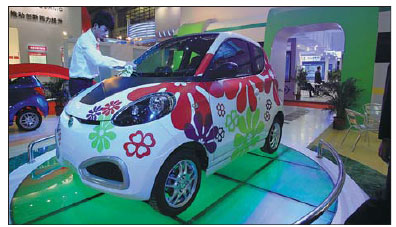Local
Blue Book: Auto industry requires structural reform
Updated: 2015-09-07By Hao Yan ( China Daily )
Report proposes measures to upgrade system, boost efficiency of government administration
The administrative mechanism in China's auto industry is outdated and needs to be upgraded, according to this year's China Automotive Industry Development report, released on Aug 31 in Beijing.
Also known as the 2015 Auto Blue Book, the publication analyzes the sector's governing system. The latest report reviewed the history of reform in China's auto industry management and proposed structural reforms to update the system.
The report, jointly composed by the Development Research Center of the State Council, the Society of Automotive Engineers of China and Volkswagen Group China, found there is an urgent need for further reform, and proposed 10 measures after discussing approaches and directions.
The blue book also suggests ways to boost the efficiency of government administration in the sector.
Volkswagen Group China Executive Vice-President Zhang Suixin said the current management system still maintained the fundamental concepts used 21 years ago.
It restrains investment and restricted entry to the industry, which is far behind the desired rate of development, and causes problems, he said.
Liu Shijin, former deputy director of the Development Research Center of the State Council, said: "Existing and emerging problems weren't solved, although we considered them for a long time. The necessity of reform stands out at this moment when auto market growth is slowing."
He emphasized innovation, industry entry and exit as three major aspects for management structure reform, as the auto industry elsewhere is leading a new industrial revolution. Disruptive technology changes require adaptive reform or anticipatory adjustment of the governing system, he said, so as to accelerate sustainable and healthy development of the industry.
"If these problems are left unsolved, they will influence the automotive industry's future development in China. The industry's development is not only about quantitative growth, but more about restructuring, better quality and stronger competency," Liu said.
Fu Yuwu, secretary-general of the Society of Automotive Engineers of China, said: "Some policies made by government agencies are themselves unlawful. They neither passed State Council discussion, nor followed the government administrative system."
Innovations needed
Liu forecast that the boundaries of the automotive industry would be blurred in the future, and that innovations could come from Internet technologies, despite the current government administration not granting such opportunities or possibilities.
"A system encouraging innovation should be nurtured, as electronic modules take more and more proportion of a car. When innovative companies are encouraged to enter the industry, they may bring disruptive technology breakthroughs."
Industrial data show that about 10 percent of an average vehicle's price covers electronic components and systems, while a luxury car's complicated electronic parts contributes on average around 15 percent of the price, equivalent to that of the engine.
Fu said: "Some redundant policies overwhelm companies, and it is the government agencies' interests behind the policies. It is tough to change the agencies' interest patterns, but companies' vitality and creativity will vanish if they don't get relief."
Fu used the new-energy vehicle sector as an example, where the swift expansion of the sector has steered investment in the traffic infrastructure and attracted emerging companies and players in other fields into the auto industry.
"In such a situation, unreasonable prerequisites and entry approvals should be eliminated."
Easier entry proposed
Zhang said government agencies overly stress the prerequisites required to enter the industry, rather than adequate supervision afterward.
He said: "Many obstacles are set for companies to conquer before entering the car-making industry, for example, qualifications, certifications, permits. But as long as a company acquires all of these and starts production, its products as sold to customers are ignored and not actively monitored."
One of the prerequisites for a carmaker is the qualification after a series of approvals and registrations that makes its production lawful, but some local permits are also required.
A recent example is the Xindayang Group, which lacks a car manufacturing qualification and has to work with qualified carmakers and utilize their plants. Xindayang joined with Zoyte Auto and Geely Auto and is now producing micro electric cars in the Zoyte and Geely plants in Gansu province.
Xindayang's three large production bases in Zhejiang and Shandong provinces and Tianjin only make electric motorcycles, electric motors and components, not cars.
"When a qualified company invests in other locations outside its registered base, it may have to spend a huge amount of money to acquire a bankrupt local company shell with local qualifications," said Zhang, referring to one possible workaround.
Liu recommended a "negative list" management approach such as is used in some free trade zones, in which areas or activities not listed are assumed to have no restrictions. The companies should manage production, investment and plants, he said, as they can best make decisions based on their own situations.
"The government should handle the major issues from the macroeconomic perspective, including energy efficiency, environmental protection and work safety," Liu said.
haoyan@chinadaily.com.cn
|
A Xindayang electric vehicle is displayed at a show in Shenzhen. The company has to produce its cars at the Zoyte and Geely plants because it lacks a car manufacturing qualification. Zou Zhongpin / China Daily. |



